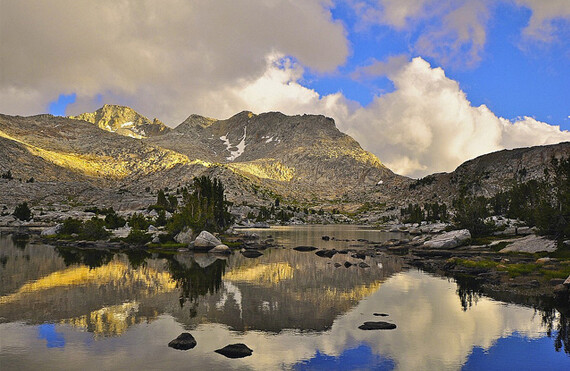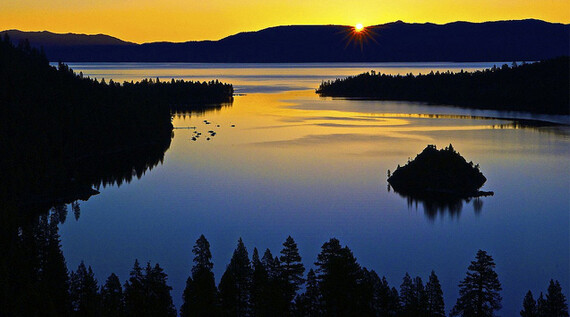Richard Evanoff, professor of environmental ethics at Aoyama Gakuin University in Japan, recently wrote the book Bioregionalism and Global Ethics: A Transactional Approach to Achieving Ecological Sustainability, Social Justice, and Human Well-being. I corresponded with him on the concepts and applications of bioregionalism, a movement with roots in the ecopolitics of the 1970s, and how it might be useful in turning toward an ecological civilization today. In part one we discussed the political underpinnings of the movement; in part two some of the implementation; here we look at whether bioregionalism can scale globally.
EVAN O'NEIL: There has been a movement in some countries to grant rights to ecosystems and even to Mother Nature. Is this a helpful approach?
RICHARD EVANOFF: In the United States the idea of giving rights to nature can be found in the dissenting opinion of Supreme Court Justice William O. Douglas in the Sierra Club v. Morton decision of 1972. Douglas argued that if corporations could be regarded as "persons" for legal purposes, natural ecosystems should also be granted standing before the law. The present constitutions of both Ecuador and Bolivia grant rights to ecological systems. From a bioregional perspective it is possible to simultaneously protect both human rights and the rights of nature on the basis of creating a symbiotic relationship between human cultures and the natural environments they inhabit.
The dichotomy "humans vs. the environment" only arises in the context of current forms of industrial society that promote the excessive consumption of resources at the expense of the environment. Thus, providing a constitutional and legal basis for preserving the rights of nature makes perfect sense as a reaction to a global economic and political order that prioritizes economic growth over environmental preservation. Societies that were truly organized along bioregional lines would seek to preserve natural environments as a matter of course, even if the rights of nature were not formally protected by law.
EVAN O'NEIL: Other policy ideas include Payments for Environmental Services, paying developing countries not to extract resources such as oil, and alternative economic measures like the Happy Planet Index. Do these tactics have promise?
RICHARD EVANOFF: The whole idea of trying to place a monetary value on environmental services and ecosystems is questionable from a bioregional perspective. Natural environments should be protected because people realize the extent to which both human and nonhuman life is dependent on such systems. Ultimately monetary compensation is no substitute for protection based on a recognition of the fact that good human societies cannot be created in the absence of good natural environments, and vice versa.
On the other hand, the bioregional paradigm is fully supportive of efforts to rethink what constitutes genuine human well-being and of attempts to formulate different methods for measuring it, including not only the Happy Planet Index, but also other indices, such as the Index of Sustainable Economic Welfare, the Genuine Progress Indicator, and Bhutan's Gross National Happiness Index.
EVAN O'NEIL: How do you feel about multilateral processes like Rio+20 and the UNFCCC?
RICHARD EVANOFF: Such international forums are at best irrelevant and, at worst, something to be opposed, given the extent to which they are manipulated by business interests acting in concert with national governments. They exclude the full participation of groups acting on behalf of the interests of citizens and the environment, and are unable to come up with genuinely effective solutions. The range of solutions that can be adopted at such forums is severely limited by the need to refrain from making any proposals that threaten corporate interests or continued economic growth, in both the developed and developing worlds.
Moreover, by concentrating decision-making power at the global level, such processes simply co-opt the ability of indigenous peoples and local communities to protect their own environments. Real change will not come until citizens themselves reclaim their ability to take effective action. The key question, from a bioregional perspective, is how to mobilize citizens to do so.
EVAN O'NEIL: So how does bioregionalism scale and spread and catch on?
RICHARD EVANOFF: Bioregionalism as such is only a very small part of a much larger movement on the part of people around the world to gain power over their own lives and to practice sustainable lifestyles within the context of local communities and environments. What bioregionalists can contribute to the larger movement is an analysis and critique of the current global situation, and the formulation of viable alternatives, in both theory and practice.
Real change will not come until citizens themselves reclaim their ability to take effective action.
Currently there is a much greater awareness of the pitfalls of the present form of globalization among people in developing countries, who are often those most affected by policies that strip them of their local resources and livelihoods, as well as of any political power to resist such policies. Nonetheless, such people are beginning to organize to reclaim their ability to make their own decisions and to protect both their local communities and environments.
Consciousness of the problems associated with current forms of globalization is much less widespread among people in developed countries, who have been the primary beneficiaries of the exploitation of resources and labor from developing countries. Nonetheless, as evidenced by the Tea Party and Occupy Wall Street movements in the United States, people are beginning to recognize that something is "not quite right" with our present system.
As more jobs disappear overseas due to outsourcing and governments increasingly lose tax revenue to support social services, the middle class in the United States is now beginning to experience what has been a fact of life for the lower classes for the past few decades, since globalization really began to take off. The present troubles of the European Union are, at least in part, due to its economic centralization policies. Nonetheless, there still seems to be a lot of faith among people in developed countries in the idea that the system can be reformed and the old industrial-consumerist model restored, through more economic growth, better-paying jobs, and the like.
Bioregionalism suggests that the old order cannot be restored, simply because we are entering a period in which resources (particularly energy resources) are rapidly dwindling, pollution (especially related to climate change) is increasing, food production may be unable to keep up with population growth, and environmental problems have become truly global, affecting the entire planet—the air, water, land, and oceans that we depend on to sustain human and nonhuman life.
It takes a considerable amount of looking the other way to fail to see just how dire our current situation is. Already in 1972 The Limits to Growth warned that unless we seriously curtail excessive industrial production and curb population growth, the present economy would collapse around the year 2035. More recent editions of the book (published in 1992 and 2002), show that we are already living "beyond the limits," and that there is considerably less time for us to be able to make the transition to a truly sustainable economy that can meet basic human needs.
The basic scenario presented in the limits-to-growth literature has been confirmed by a number of other studies, which show that we are in a period not only of peak oil, but of "peak everything." A considerable literature has also developed around the concept of "degrowth"—the idea that we should be intentionally trying to reduce overconsumption among the top 20 percent of the Earth's population. The future will inevitably be one of lower resource consumption, in which communities are obliged to meet their basic needs on the basis of locally available resources.
Technology alone will not be able to prop up the present system.
Technology alone will not be able to prop up the present system. Trashing landscapes in search of more fossil fuels and burning food for biofuel do not seem like attractive ways of providing energy for the future. What we should be doing is preserving and maintaining as much of the natural environment as possible, while taking proactive measures to provide for basic needs on a universal scale.
Bioregionalism is often dismissed as a "utopian" perspective on the grounds that it is "not what people want," and to some extent this is no doubt true. We remain captivated by the idea that developed countries can continue to pursue unlimited economic growth and that developing countries will eventually be able to catch up with the developed countries in terms of material affluence. It is really this latter view that is utopian, however, simply because the Earth does not have enough resources to be able to maintain current levels of overconsumption, let alone extend consumerism universally.
The Global Footprint Network estimates that it would take the resources of five planet Earths for everyone on the planet to able to have the same consumer lifestyles currently prevalent in the United States. So, there is a tremendous gap between our aspirations and our ecological realities. Neither the media nor the educational system have done a very good job of making people aware of these issues. Given the ability of current economic and political actors to limit the range of what is regarded as acceptable political discourse, one of the most urgent needs at present is to simply make people aware of the situation and propose viable alternatives. I suspect that this will happen not through the established channels of political deliberation but rather through alternative forms of political organizing and communication (such as the Internet).
There are reasons to be skeptical about the possibilities for avoiding collapse and instituting a genuinely sustainable economy, given the low level of awareness about these issues, particularly in developed countries. If collapse cannot be avoided, it is likely that the developed countries, which are currently so dependent on global trade, will suffer the most, while people in developing countries who are already capable of providing for their needs on the basis of local resources (to the extent that these have not already been plundered) will be in the best position to preserve both their livelihoods and local cultures.
Even if total collapse can be avoided in the developed countries, it is possible that the result will be a new feudalism, in which current elites are able to maintain power and relative wealth, backed up by increased militarization and surveillance, as we already see happening at present, while the rest of the population is reduced to subservient status. For many people in developed countries the future could look much like the current situation in Detroit, where industry and government social services have collapsed, and people are beginning to turn to more self-sufficient methods of survival, such as urban agriculture.
The bioregional vision is achievable not utopian, when people decide it is the kind of future they would like to create.
Bioregionalism proposes an alternative future in which overconsumption is drastically reduced, and the focus is shifted to providing for the human well-being of all on the basis of local forms of energy, agriculture, housing, and manufacturing. In the short term this shift would necessitate giving up jobs that are based on the global economy and access to consumer goods produced overseas, but these are likely to disappear in the near future in any event. In the long term, the shift would involve stimulating local economies, so that everyone can be usefully employed in the production of food and goods that meet their basic needs, and also provide for greater democratic participation in the political decision-making process.
By avoiding planned obsolescence, which necessitates higher resource consumption and the generation of more waste in the interest of selling more products to insure higher profits, and instead making products that are durable, repairable, and recyclable, working hours can also be reduced, allowing people more free time to pursue other personal and cultural activities. The bioregional vision is, in fact, not "utopian," but realistically achievable, if and when people decide it is the kind of future they would like to create.




